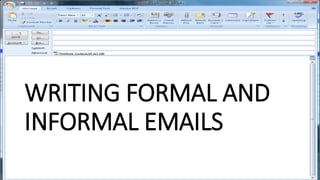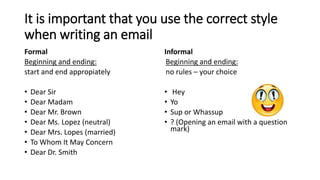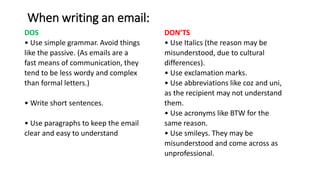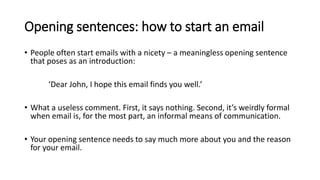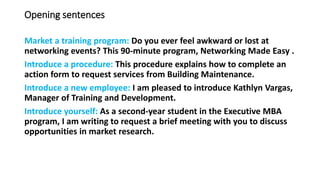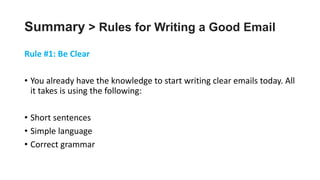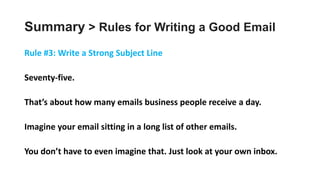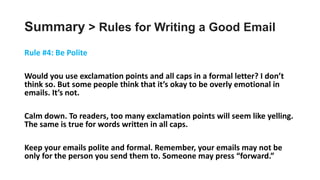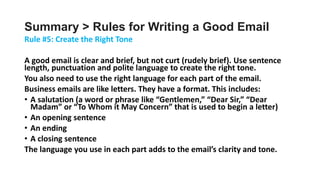- 1. WRITING FORMAL AND
INFORMAL EMAILS
- 2. It is important that you use the correct style
when writing an email
Formal
Purpose: Business and important messages
Audience: Business and work colleagues
Style and accuracy: Professional – accurate
spelling, punctuation and grammar
Don’t use slang, exclamation marks or smilies
In formal emails
Informal
Purpose: Informal messages
Audience: Friends and family
Style and accuracy: Friendly- accuracy is less
important
- 3. It is important that you use the correct style
when writing an email
Formal
Beginning and ending:
start and end appropiately
• Dear Sir
• Dear Madam
• Dear Mr. Brown
• Dear Ms. Lopez (neutral)
• Dear Mrs. Lopes (married)
• To Whom It May Concern
• Dear Dr. Smith
Informal
Beginning and ending:
no rules – your choice
• Hey
• Yo
• Sup or Whassup
• ? (Opening an email with a
question mark)
- 4. It is important that you use the correct style
when writing an email
Formal
No contractions
We often "contract" or shorten
words in English. For example, we
may say "he's" instead of "he is".
Note that we usually insert an
apostrophe (') in place of the
missing letter or letters in writing.
Informal
Contractions can be used
Here are some example
sentences:
• I haven't seen him. (I have not seen
him.)
• Who's calling? (Who is calling?)
• They're coming. (They are coming.)
- 5. DOS
• Use an informative subject line,
which says what the email is
about.
• Write the most important
information first.
• Use numbers and bullet points
to
make the message clearer.
DON’TS
• Write ‘hello’ as your subject line.
• Write about irrelevant issues. The
reader will soon hit ‘delete’ if the
email doesn’t get to the point.
• Give personal information that you
don’t want anyone else to know.
(The email could end up in the
wrong hands)
• Use CAPITAL LETTERS to write
whole words as in emails, this is
considered SHOUTING.
- 6. When writing an email:
DOS
• Use simple grammar. Avoid things
like the passive. (As emails are a
fast means of communication, they
have fewer words and are less
complex than formal letters.)
• Write short sentences.
• Use paragraphs to keep the email
clear and easy to understand
DON’TS
• Use Italics (the reason may be
misunderstood, due to cultural
differences).
• Use exclamation marks.
• Use abbreviations like coz and uni,
as the recipient may not understand
them.
• Use acronyms like BTW for the
same reason.
• Use smileys. They may be
misunderstood and come across as
unprofessional.
- 7. Opening sentences: how to start an email
• People often start emails with a nicety – a meaningless opening sentence
that poses as an introduction:
‘Dear John, I hope this email finds you well.’
• What a useless comment. First, it says nothing. Second, it’s weirdly formal
when email is, for the most part, an informal means of communication.
• Your opening sentence needs to say much more about you and the reason
for your email.
- 8. Opening sentences: how to start an email
There are certain questions we ask ourselves every time we start a new
email:
• Why am I writing this email?
• What do I want to tell my recipient?
• What do I want them to do as a result of my email?
- 9. Opening sentences: how to start an email
Your reader will ask themselves their own set of questions when they open
an email from you:
• Who is this person?
• What are they emailing me about?
• How important is this email to me?
• Do I need to respond?
- 10. Opening sentences
Reasons for writing your letter or email
• In reply to your letter ... .
• Thank you for your letter of May 14th concerning … .
• Thanks for your email ... .
• Following our phone conversation ... .
• Thank you for your letter.
• It was kind of you to write to me.writing email and letters opening
sentences
• I am writing to inform you that..
- 11. Opening sentences
Deny a request: Thank you for writing to ask about attending the
conference in Baltimore. I wish I could approve your request.
Apologize: Please accept my apology for missing the meeting yesterday. I
am sorry that a medical appointment prevented my attending.
Congratulate: Congratulations on successfully passing the bar exam. Your
hard work has paid off!
Invite: You are invited to the opening of the ‘2017 Fashion Fair’ on Sunday,
16 April, from 4 to 6 p.m. at the AHOY in Rotterdam.
- 12. Opening sentences
Respond to a letter of complaint: Thank you for writing to us about
your experience in the airport last week.
Confirm an agreement: I am happy to confirm our agreement about
the summer institute.
Provide a reference: Jessica Dell has asked me to provide information
to you in support of her job application, and I am pleased to do so.
Request a letter of reference: I am applying to graduate schools in
marine biology, and I would be very grateful if you would write a
letter of reference for me.
- 13. Opening sentences
Request approval: I would appreciate your approval to attend a
training program on project management to meet my annual
performance goals. Here are the details:
Request information: I am seeking the answers to two questions
about customs declarations for a shipment to Russia.
Share information: I received some important information from Dr.
Owens, and I believe it will be useful to you as you analyze the
research data.
Explain a change in policy: I want to let you know about a new tuition
reimbursement policy we will implement in January.
- 14. Opening sentences
Market a training program: Do you ever feel awkward or lost at
networking events? This 90-minute program, Networking Made Easy .
Introduce a procedure: This procedure explains how to complete an
action form to request services from Building Maintenance.
Introduce a new employee: I am pleased to introduce Kathlyn Vargas,
Manager of Training and Development.
Introduce yourself: As a second-year student in the Executive MBA
program, I am writing to request a brief meeting with you to discuss
opportunities in market research.
- 15. Closing lines: phrases for closing an email
Expressions for thanking
• Thank you for your help. / time / assistance / support
• I really appreciate the help. / time / assistance / support you’ve
given me.
• Thank you once more for your help in this matter.
- 16. Closing lines: phrases for closing an email
Expressions with a future focus
• I look forward to hearing from you soon / meeting you next Tuesday.
• I look forward to seeing you soon.
• I’m looking forward to your reply.
• We hope that we may continue to rely on your valued custom.
• We look forward to a successful working relationship in the future.
• Please advise as necessary.
• I would appreciate your immediate attention to this matter.
- 17. Closing lines: phrases for closing an email
Expressions for showing them you want to help
• If I can be of assistance, please do not hesitate to contact me.
• If you require any further information, feel free to contact me.
• If you require any further information, let me know.
• Please feel free to contact me if you need any further information.
• Please let me know if you have any questions.
- 18. Closing lines: phrases for closing an email
Expressions for showing them you want to help
• I hope the above is useful to you.
• Should you need any further information, please do not hesitate to
contact me.
• Please contact me if there are any problems.
• Let me know if you need anything else
• Drop me a line if I can do anything else for you.
- 19. Summary > Rules for Writing a Good Email
Rule #1: Be Clear
• You already have the knowledge to start writing clear emails today. All
it takes is using the following:
• Short sentences
• Simple language
• Correct grammar
- 20. Summary > Rules for Writing a Good Email
Rule #2: Make It Brief
• How much does it cost to send two emails instead of one? Nothing.
• So, why write about a bunch of topics in one email? Keep your emails brief by
focusing on only one topic.
• Explain your main reason for writing in the first paragraph. Be specific about
what it is you want.
• “Start by asking yourself what you want the person to do as a result of this
email.”
- 21. Summary > Rules for Writing a Good Email
Rule #3: Write a Strong Subject Line
Seventy-five.
That’s about how many emails business people receive a day.
Imagine your email sitting in a long list of other emails.
You don’t have to even imagine that. Just look at your own inbox.
- 22. Summary > Rules for Writing a Good Email
Rule #3: Write a Strong Subject Line
What makes you want to open an email? Maybe the name of the
person sending it. But if you’re like most people, you’ll open an email
that has a strong subject line.
Your subject line is like a headline in a newspaper. The subject line
needs to attract attention and make someone want to read your
email.
- 23. Summary > Rules for Writing a Good Email
Rule #3: Write a Strong Subject Line
You can write strong headlines by using the “4 U’s” approach.
The 4 U’s of writing headlines are:
• Unique
• Urgent
• Useful
• Ultra-specific (very specific)
Your email subject lines should definitely be useful and ultra-specific.
Apply the other two U’s only when it makes sense to do so.
- 24. Summary > Rules for Writing a Good Email
Rule #4: Be Polite
Would you use exclamation points and all caps in a formal letter? I don’t
think so. But some people think that it’s okay to be overly emotional in
emails. It’s not.
Calm down. To readers, too many exclamation points will seem like yelling.
The same is true for words written in all caps.
Keep your emails polite and formal. Remember, your emails may not be
only for the person you send them to. Someone may press “forward.”
- 25. Summary > Rules for Writing a Good Email
Rule #5: Create the Right Tone
A good email is clear and brief, but not curt (rudely brief). Use sentence
length, punctuation and polite language to create the right tone.
You also need to use the right language for each part of the email.
Business emails are like letters. They have a format. This includes:
• A salutation (a word or phrase like “Gentlemen,” “Dear Sir,” “Dear
Madam” or “To Whom it May Concern” that is used to begin a letter)
• An opening sentence
• An ending
• A closing sentence
The language you use in each part adds to the email’s clarity and tone.
- 26. Dear student of English,
I hope this information is helpful to you.
Yours faithfully,
M. van Eijk/MA

